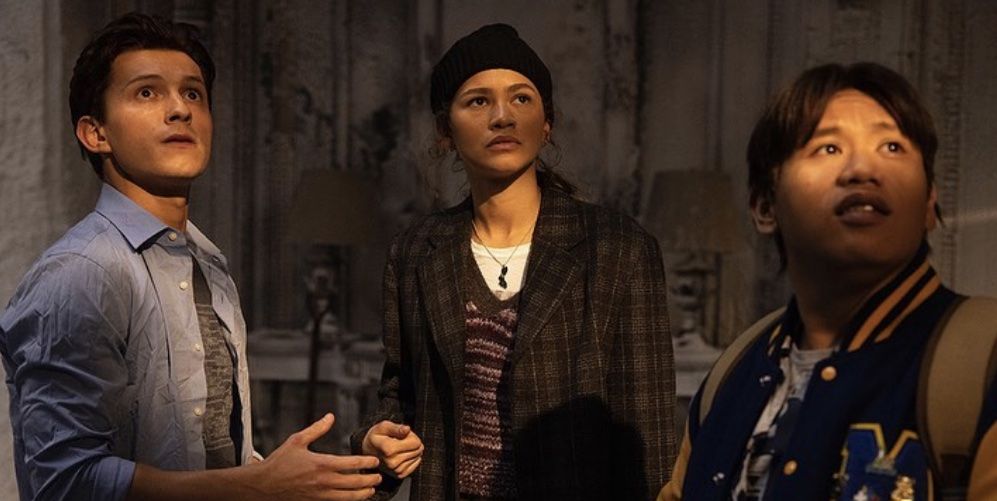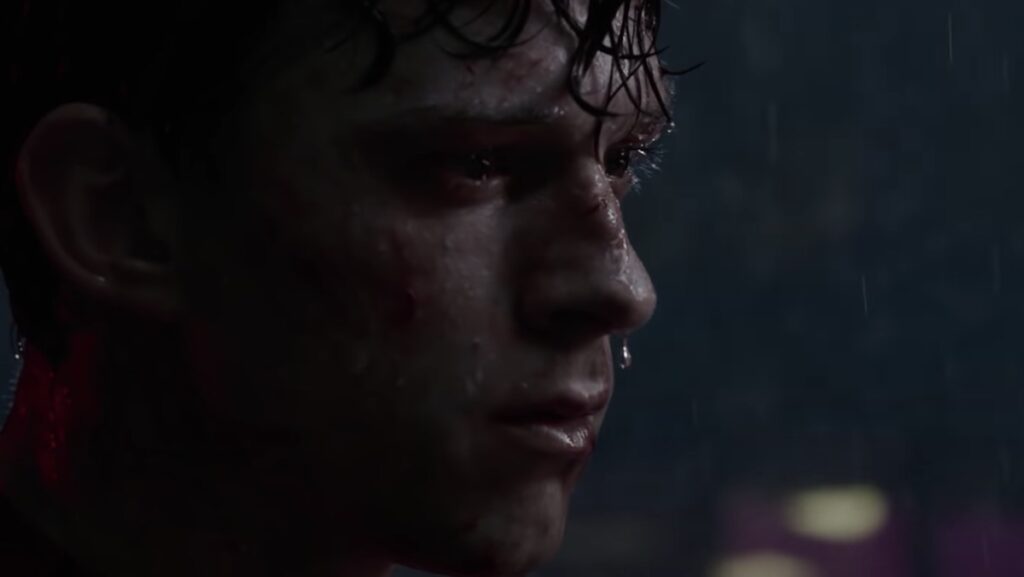

Marvel’s latest pulls in past iterations of the Spider-Man franchise for Peter Parker’s greatest battle
Reviewing a film like Spider-Man: No Way Home is difficult in the way that, like an episode of a television series several seasons in, it requires prior knowledge or at least a strong enough familiarity with all that’s come before. This is the third entry in the current iteration of the big screen, live-action Spider-Man, but it’s also his sixth overall appearance in the greater Marvel Cinematic Universe, which is now comprised of a whopping twenty-seven movies and several TV series.
But No Way Home also asks viewers to look back on two previous takes of the character, the original Sam Raimi trilogy of the early 2000s and the pair of Marc Webb films that came later, and (for much of the jokes and emotional beats to properly land) have the sort of sentimental attachment to them that comes from the years spent with them in the pop culture stew, both online and off.
That’s clearly not a problem for the majority of Spidey fans who showed up en masse this past weekend to send Disney’s year-end profits to the stratosphere (No Way Home opened to the second-largest box office weekend draw ever, only behind Avengers: Endgame). Nor is it an issue with this particular critic, who has seen every chapter of the MCU and every Spider-Man movie since the first two Raimi ones captured his wonder, imagination and heart before he was even a teenager.

No Way Home joins the ranks of the ongoing bombardment of legacy sequels that are nearly impossible to divorce from their respective franchise’s place in culture; films that draw heavily on nostalgia, in-universe references both subtle and blatant, and appearances from the original cast. Films like Ghostbusters: Afterlife, the Jurassic World trilogy, the new Halloween films, Disney’s Star Wars films and series, and even the upcoming Scream movie have their fans’ perceptions and expectations cooked into their DNA.
This latest Spider-Man adventure, now the third to be directed by Jon Watts, is no exception. In fact, it often feels like the culmination of fan-driven storytelling and universe mashups, quite literally delivering exactly what fans have been asking for, sometimes to a fault. The film indulges itself a bit too much, losing much of its element of surprise (unless you’ve managed to avoid any sort of discussion or trailers for it) and even being a bit embarrassing in the way it can’t help but wink at the audience and hold for applause (which there was plenty of at my screening) several times too many. We were guaranteed to get this kind of movie eventually, if the excellent Spider-Man: Into the Spider-Verse was any indication (or the less excellent Space Jam: A New Legacy and Ralph Breaks the Internet).
Yet No Way Home, for all of its pandering and self-indulgence, still manages to tell a Peter Parker story that’s one hundred percent worth telling; one that shows how, at the end of the day, Marvel Studios still has the necessary understanding of who their most popular character is at his core. Peter is a good kid who is repeatedly punished for trying to do the right thing, living a life that’s trapped in a cycle of loss and sacrifice, and – for this particular version of him – where normalcy is both a distant memory and an impossible dream. This movie is a commemoration of everything about Peter Parker that people have loved for so long, and for all its flaws, it still delivers on what’s most important.

Picking up immediately from the events of Far From Home, Peter (Tom Holland) has just been outed to the world as Spider-Man, which completely uproots his life and the lives of those close to him – his girlfriend MJ (Zendaya), best friend Ned (Jacob Batalon), and aunt May (Marisa Tomei). Filled with guilt, Peter seeks out Doctor Strange (Benedict Cumberbatch) in hopes that his reality-bending powers can fix things, and the two decide on a spell that will make everyone forget Spider-Man’s secret identity. But things naturally go awry when Peter tries to alter the spell so his loved ones won’t forget, leading to a cascade of supervillains from other universes – including Doc Ock (Alfred Molina), Electro (Jamie Foxx), the Lizard (Rhys Ifans), Sandman (Thomas Haden Church) and the Green Goblin (Willem Dafoe) – breaking through into the world of the MCU in search of Peter Parker.
Despite a hefty runtime of nearly two and a half hours, No Way Home bounces along at the MCU’s usual brisk pace, and like Watt’s previous Spidey flicks, is often very funny and feels imbued with a genuinely youthful energy. It’s nice to see MJ and Ned take a more active role throughout the film as they help Peter roundup the multiverse villains, and the group now goes through the emotional lows together as opposed to Peter mostly suffering on his own in the previous two films.
Holland once again proves to be brilliant in the role, but the most engaging and essential aspect to this particular Peter Parker is the fact that he’s remained a kid. A kid who’s battled monsters and aliens and been put through the wringer, but still a kid, one who makes rash and impulsive decisions that quickly become messy more often than not. Andrew Garfield’s Peter graduates from high school at the very start of his second movie, Tobey Maguire’s Peter had graduated halfway through his first. But even six appearances in, Holland’s Peter is still in high school! It’s a welcome change. Multiverse hijinks and celebratory cameos can be fun, sure, but the best part of No Way Home is that Peter’s choices are what drive the story from beginning to end. And those choices are always in service of others, even at considerable personal loss to himself.

There have been many valid criticisms of the MCU’s take on the friendly neighborhood superhero and this latest film doesn’t fix all of them. The constant connection of Peter and his enemies to Tony Stark is at last left in the rearview and May is finally given a pair of pivotal moments, but the poverty that’s defined Peter for decades is still completely absent – a joke where he tells MJ that despite being famous he’s still poor doesn’t exactly land when he’s currently living in a large apartment filled with Stark tech and has a gorgeous view of the city. Almost every action sequence becomes CG overload as well, losing any sense of weight and tangibility, although one crucial fight between Peter and Green Goblin manages to make every punch feel like it has the proper power behind it, and becomes one of the film’s best sequences because of it. Dafoe, naturally, nearly steals the entire show.
No Way Home is a fan service film of the highest order, one that loses much of its ability to surprise or function well outside of its cultural context and may very well be proof of Marvel becoming the snake that eats its own tail. And yet, and yet, the truly important parts of Peter’s journey absolutely hit the way they should, and the film’s firm grasp on what has continued to make the character so endearing for so long makes for one his most touching stories, one that feels definitive, conclusive, and truly heroic.
‘Spider-Man: No Way Home’ is now playing exclusively in theaters.